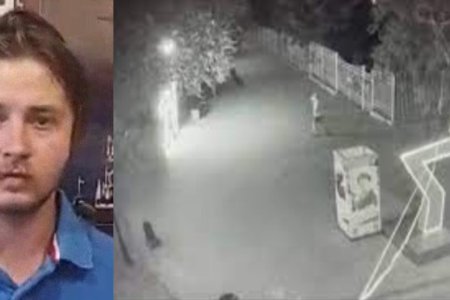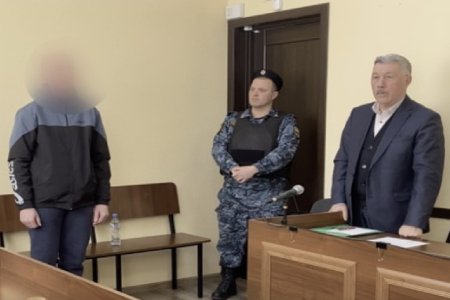
The Russian occupation ‘Crimean high court’ has sentenced Yevhen Shved to two and a half years’ imprisonment for a post on his Telegram channel in which he criticized the hypocrisy and falseness around Russia’s marking of Victory Day on 9 May. The 31-year-old Ukrainian from Dzhankoi was prosecuted under a norm on supposed ‘rehabilitation of Nazism’, one of many articles of Russia’s criminal code used by the current Russian regime, occupying Crimea, to persecute people for expressing their views. The ‘judge’ in this case, Natalia Kulinskaya, has previously gained notoriety for her part in the politically motivated imprisonment of Ukrainian civic journalist and activist Iryna Danilovich.
Shved is also a victim of the so-called ‘Crimean SMERSH’ vigilantes who appear to work in close cooperation with the Russian occupation ‘police’ in hunting out Crimeans for pro-Ukrainian views or for criticising Russia’s war against Ukraine.
Although the charge against him may appear to be over events marking the Soviet Union’s defeat of Nazi Germany, this is only at first glance. The current Russian regime, under Vladimir Putin, has heavily mythologized WWII; persecuted those who contradict the Kremlin’s false historical narrative and is now seeking to liken the Soviet Army’s role in fighting the Nazi invaders to Russia’s war of aggression against Ukraine. It is almost certainly in this light that one should understand the post on Yevhen Shved’s Telegram page for which he was arrested.
Shved called 9 May a “foul, scummish and perverted pseudo holiday” and spoke of the hypocrisy, of War veterans abandoned to live out their days in abject poverty in his apartment block. “Heroes of the fatherland”, not needed by anybody, forgotten, discarded like second-class material”.
Shved ‘s arrest was reported on 20 July 2023 by the Telegram channel Astra, although people had reported on his Telegram channel that there had been no contact with him since 19 June. In fact, there is an extremely ominous report on the Russian propaganda website Politnavigator from 16 June, which calls Shved a ‘zhdun’, the term used by supporters of Russia’s aggression against Ukraine about Ukrainian patriots who are waiting for the Ukrainian Armed Forces to liberate their occupied territory. The text claims that Shved could be sentenced to 15 years “for crimes against state security” over his circulation of his views in social media. In video clips, Shved had been negative about Russia’s war against Ukraine, about the lies told, etc. and had predicted Ukraine’s victory within six months.
By 16 June, it thus seems, the 30-year-old had been ‘denounced’ by Crimean SMERSH and was being “worked on” by Russia’s so-called ‘centre for countering extremism’. While it is quite likely that torture was also applied, the videos posted by Crimean SMERSH in which Shved is shown ‘apologising’ may well have been because of the threat, as the propaganda site says, of at least four criminal charges “against state security”.
The ’apology’ has clearly been learned by heart, and uses words that Shved would, almost certainly not have used by choice {‘special military operation’, ‘Kyiv regime’, etc.). His captors had presumably not decided what to charge him with, and got him to apologise for supposedly ‘discrediting’ Russia’s armed forces and insulting Russia’s government. He was made to “express support” for all those fighting Russia’s war against Ukraine, and to “thank” Putin, claiming that this is for “the defence of our great country from foreign aggressors” [sic]
It is of immense concern that Shved was effectively abducted more than a month before his detention in SIZO [remand prison] No. 1 was reported. On 20 July, Astra explained that Shved had been charged (on 13 July) with so-called ‘rehabilitation of Nazism’, under Article 354.1 § 4 of Russia’s criminal code. Russia’s law on ‘rehabilitation of Nazism’, introducing this new criminal charge, was signed into force on 5 May, 2014. The new article envisaged a sentence of up to three years imprisonment for what was termed ‘public denial or approval of the facts established by the sentence of the Nuremberg Tribunal’. The same norm made it possible to prosecute somebody for “spreading knowingly false information about the activities of the USSR during the years of the Second World War”. Thus far, it has been used, for example, to prosecute Vladimir Luzgin for reposting a text which stated, quite correctly, that both Nazi Germany and the USSR invaded Poland in September 1939. In September 2023, a Russian court convicted architect Sergei Volkov of the same purported ‘rehabilitation of Nazism on the Internet’ for his accurate account of the collaboration between the USSR and Nazi Germany for the first two years of World War II, and his criticism of Soviet dictator Joseph Stalin in connection with the Siege of Leningrad.
The use of this charge against Shved is different, but equally difficult to understand According to Crimean Process which reported the sentence on 27 February 2024, the claim appears to have been that Shved had somehow “circulated knowingly false information about the activities of the USSR during the years of WWII, as well as circulating information about days of military glory expressing overt disrespect for society.”
Crimean Process reports that Shved made the above ‘apology’, and a ‘voluntary donation’ to the Russian war, and was, in return, promised a suspended or a short sentence. In December 2023, his mother reported that they were hoping for a suspended sentence, or term of imprisonment of around one year. This, she said, would be covered by the nine months that he had already been held in SIZO [remand prison].
On 27 February, Natalia Kulinskaya sentenced him to two and a half years’ imprisonment, and also banned him from administering websites for four years. Since there were only two ‘hearings’ and ‘special procedure’ (without examination of the evidence, presumably because of Shved’s admission of ‘guilt’), it is unlikely that he would even have the option of appealing the sentence.



